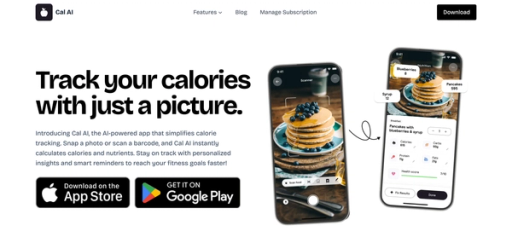
Many of us have been there before: you’re happily munching away on your favorite carbs, when someone—an authority figure, a fitness guru, a health website—drops a bomb that sends your world into a panic. “Do you know what those will do to your waistline?” they say. “You should really cut back on carbs if you want to lose weight.” Cue the internal meltdown, as the once-enjoyable meal suddenly feels like a crime scene. The truth is, carbs aren’t the enemy. In fact, they’re an essential part of a healthy diet. In this article, we'll explore the relationship between carbs and fat gain to help you make informed choices about carbs that align with your health goals. With this knowledge, you’ll learn to enjoy carbs without fear, maintain a healthy weight, and live your life free of unnecessary restrictions. We will also touch upon "how to hit your macros?".
Cal AI’s calorie tracker can help you achieve your objectives by showing how carbs fit into your diet so you can enjoy them without guilt.

One of the biggest nutrition misconceptions is that eating carbohydrates makes you fat. After all, haven't celebrities and influencers been sharing their low-carb weight-loss success stories for years?
"Carbs are an easy villain for those touting restrictive diets for weight loss," says Lauren Harris-Pincus, M.S., RDN, founder of NutritionStarringYOU.com and author of The Everything Easy Pre-Diabetes Cookbook. "This is largely because we overeat so many foods that are high in carbs but low in nutrients, like those found in ultra-processed snack foods, desserts and fast food," adds Harris-Pincus.
But, believe it or not, the 2020-2025 Dietary Guidelines for Americans recommends eating 45% to 65% of daily calories from carbs.
Although those recommendations may seem high, there's a good reason that you need so many carbs; they provide energy for everyday life. Plus, not all carbs are created equal. Some carb-rich foods are highly nutritious, while others are may not offer much besides calories that burn up quickly.
Carbohydrates are the body's preferred energy source. They help control blood glucose and insulin metabolism, provide fiber, fuel the brain, supply energy for daily activities and exercise and play a role in cholesterol and triglyceride metabolism. Someone following a 2,000-calorie diet should aim for about 900 to 1,300 calories (or 225 to 325 grams) of carbohydrates per day.
There are two types of carbohydrates: simple and complex. Simple carbohydrates have just two sugar molecules and are rapidly digested. They are found in foods like honey, sugar, desserts, chips, soda, and refined grains. Complex carbohydrates have more sugar molecules and take longer to digest.
They're often paired with fiber and other nutrients that help the body break them down more slowly and have more sustained energy, versus a sharp spike and crash. Foods contain complex carbohydrates include:
"It's really important to differentiate between nutrient-dense whole-food carb sources and those that are ultra-processed and refined," says Harris-Pincus. "Carb-based fiber-rich foods, like fruit, veggies, beans and whole grains, provide essential nutrients as well as antioxidants and phytonutrients that can help to prevent the development of lifestyle diseases, like diabetes, cardiovascular disease and some [types of] cancers," she adds.
"Carbohydrates and protein both contain 4 calories per gram, so it's the portion size and type of carb that matters for weight gain," says Harris-Pincus. Weight gain oftentimes is related to consuming more calories than you burn consistently over a long period. According to Harris-Pincus, the types of food you choose are as important as the calories they contain.
"Meals containing foods with protein, fiber and heart-healthy fats are digested and absorbed slowly, which helps to keep you satisfied longer and consume fewer overall calories," says Harris-Pincus.
On the other end of the spectrum, ultra-processed foods, like chips and cookies, are hyper-palatable and easy to overeat, so the calories add up very quickly. In fact, a diet high in ultra-processed foods is associated with an increased risk of obesity and heart disease. Although carbs are often demonized, science says they aren't the cause of weight gain.
A 2022 review of the research found no difference in weight loss when people who were categorized as overweight or obese ate either low‐carbohydrate or balanced‐carbohydrate weight‐reducing diets.
Another 2022 systematic review in the European Journal of Clinical Nutrition examined the effectiveness of a low-fat, high-carbohydrate diet on weight loss and cardiovascular risk factors compared to a low-fat, high-fat diet.
The study authors concluded that both diets effectively helped control weight and reduced cardiovascular risk factors. The type of carbs you choose makes all the difference in your weight goals. It's important not to cut carbs completely from your diet because they are the body's primary energy source, and they are a good source of several vitamins and minerals the body needs to thrive.
Dietary carbs are broken down into glucose, a sugar that feeds the cells, tissues, organs and brain. Without enough carbs, the body starts to break down muscle or fat for energy, although the brain can't easily use these fuel sources. Skimping on carbs is an inefficient process for the body and can cause brain fog and lethargy, which could cause you to eat more.

I’m not going to talk about this for very long, because hundreds of articles on the internet give you lists of carbohydrates that you “should” and “shouldn’t” eat, pitting them off against each other like some sort of gladiatorial fight to the death. I’m not going to do that. Of course, certain foods have more nutrients than others, and yes, fibrous carbs will have the best overall impact on our health.
Can you do me a favor, though? Seeing as food doesn’t have a moral value, can we stop using the words “good” and “bad” when it comes to what we eat? It’s not helpful, and I’d argue it harms our relationship with food. It’s possible to recognize the hierarchy of benefit that certain foods have without demonizing others to the extent of exclusion and restriction.
Now let’s get on to the main reason why I felt the need to write this article: Why do people believe that carbs make us fat?
Hypotheses in science are made to be tested. The problem with this particular one is that it’s been falsified (proven incorrect) multiple times. Yet, those who hold carbohydrates responsible for obesity have all built massive careers off it and would have much to lose by recognizing that fact. Money has a habit of ruining objective science.
When we eat carbohydrates, enzymes in our gut have to break down those polysaccharides and disaccharides before our small intestine can absorb the resulting monosaccharides. After absorption, the subsequent rise in blood sugar stimulates insulin release, enabling the cells to take up glucose and use it as an energy source.
Insulin also signals the liver to store excess glucose as glycogen. The liver can only store a certain amount of glycogen at one time, so anything extra gets converted to fat for longer-term storage, also under the control of insulin.
People usually freak out about that last bit, but relax: Fat storage is both expected and essential for the proper functioning of the human body. Fat storage, fat breakdown, the whole thing is constantly in flux.
Glucose is the most critical fuel source for the body. Because we don’t eat every minute of the day, there are times when our blood sugar levels need boosting. That’s when the previously stored glycogen gets broken down back into glucose. Depending on the body’s energy needs, fats and proteins can also be broken down to be used for fuel.
As glucose is the brain’s preferential energy source, many mechanisms are in place to keep our blood glucose levels stable. It’s a no-brainer (pun intended). When these mechanisms aren’t functioning correctly (in conditions such as diabetes), our health tends to suffer.
Since insulin upregulates fat storage and downregulates fat metabolism, it seemed reasonable to test the hypothesis that if we kept insulin stimulation at a minimum by restricting carbs, it might be easier to mobilize and use fat for energy.
But before it could be tested thoroughly, people started preemptively claiming that low carb diets (originally Atkins, more recently keto) were best for weight loss, and insulin stimulation was the reason for weight gain and obesity.
There are many nuances to this hypothesis, with many different elements being subsequently proven incorrect. But there isn’t time to go into them all in this article. So, let’s focus on the main one. In science, a hypothesis becomes proven incorrect when an integral part of it is shown to be wrong.
The theory that insulin stimulation directly causes weight gain can be tested by comparing rates of weight loss between people on a high-carb diet and people on a low-carb diet (when calories and protein are kept the same). If the theory is correct, those on the low-carb diet should lose more weight due to a lower stimulation of insulin.
The best way to test this out is through controlled feeding studies. These create a highly controlled environment, with participants living and sleeping at the lab for the duration of the study. All movement and food intake are measured and recorded. (I can’t imagine it’s particularly pleasant for those involved!).
Fortunately for us, this hypothesis has been appropriately tested repeatedly over the last three decades. This 2017 research review article by Hall and Guo examined 32 different controlled feeding studies.
The results were outstandingly clear: When calories and protein are controlled, there’s no energy expenditure or weight loss benefit from eating a low carb diet over a high carb diet. Ultimately, weight manipulation comes down to calorie control, not insulin control.

When it comes to eating carbs, it's all about balance. Sure, it’s a problem if your diet consists only of carbs, but it’s also problematic if you skip them altogether.
Low-carb diets have gone through periods of being popular for weight loss, but they are not without their drawbacks. Plus, none of them are guaranteed to make you lose weight. Many experts question the safety of low-carb diets because of fears they can contribute to complications like heart disease.
When you follow a diet plan that requires restricting carbs, your body may experience what is commonly known as "carb flu" or "keto flu," which draws its name from the popular ketogenic diet.
When you restrict your carb intake, your body burns fat for energy instead, but unfortunately, this can lead to flu-like symptoms and more. Side effects of severe carb restriction can include:
“Instead of focusing on what to cut out, create a goal to add more fiber-rich carbs to your diet,” says Harris-Pincus. Here are her top tips: Fill half your plate with at least one fruit or veggie per meal.
Fill the remaining half of your plate with a quarter lean proteins, like:
Aim to eat 25 to 38 grams of fiber per day. Try to limit added sugar intake to less than 10% of daily calories (this is around 25 to 36 grams per day, depending on your intake). Enjoy some treats as part of an overall balanced diet without fear or guilt.
Whether you want to lose weight or gain muscle, tracking your macros is essential for achieving your health and fitness goals. Macros, or macronutrients, include carbohydrates, proteins, and fats. Each are vital to your health, and finding the right balance in your diet will help you reach your goals more efficiently.
For instance, tracking your macros can help you reduce body fat while maintaining muscle mass if you want to lose weight. If you want to gain muscle, monitoring your macro intake can help ensure you're fueling your body correctly to support muscle growth and recovery. Tracking macros can also help you eat more foods you love while optimizing your body composition.

Cal AI transforms calorie tracking with our cutting-edge AI technology - just snap a photo of your meal, and we'll do the rest. Our app combines your phone's depth sensor with advanced AI models to analyze food volume, identify ingredients, and instantly calculate calories, protein, carbs, and fat content.
With 90% accuracy on visible foods and multiple tracking options like barcode scanning, food label recognition, and manual description for complex items like smoothies, we've made nutrition tracking effortless. Gone are the days of tedious manual logging calorie tracking apps. Whether scanning a full meal or a quick snack, Cal AI gives you accurate nutritional information in under 15 seconds.
Our AI learns from your feedback, continuously improving its accuracy. Stay on track with personalized insights and smart reminders, Cal AI simplifies achieving your fitness goals.
Track your calories with your camera with Cal AI's AI calorie tracker today.